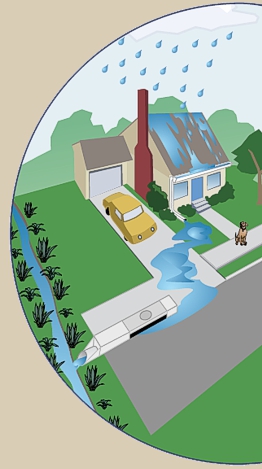 Inadequate management of runoff of storm water throughout a watershed increases flood flows and velocities, contributes to erosion and sedimentation, overtaxes the carrying capacity of streams and storm sewer, greatly increases the cost of public facilities to carry and control storm water, and can threaten public health and safety. The protection of life, land, and property from damage by excess water, whether in motion or standing, is the purpose of various flood control and drainage measures. Flooding occurs from storms that produce runoff exceeding the capacity of the normal stream channels. Long, heavy, widespread storms, or rapid melting of snow from a large area cause floods on main stem streams and rivers. As urban density increases, so do the problems of flooding from storm water runoff.
Inadequate management of runoff of storm water throughout a watershed increases flood flows and velocities, contributes to erosion and sedimentation, overtaxes the carrying capacity of streams and storm sewer, greatly increases the cost of public facilities to carry and control storm water, and can threaten public health and safety. The protection of life, land, and property from damage by excess water, whether in motion or standing, is the purpose of various flood control and drainage measures. Flooding occurs from storms that produce runoff exceeding the capacity of the normal stream channels. Long, heavy, widespread storms, or rapid melting of snow from a large area cause floods on main stem streams and rivers. As urban density increases, so do the problems of flooding from storm water runoff.
One of the most important aspects of a storm water system is the fact that it will drain into the ground or a stream, which then becomes a source for our drinking water supply. For this reason the state of Pennsylvania has established strict guidelines which need to be followed when dealing with or working around storm sewers.
The Pennsylvania legislature enacted the Storm Water Management Act (No. 167) in 1978 to authorize a program of comprehensive watershed storm water management, which retains local implementation, and enforcement of storm water ordinances similar to local responsibility of administration of subdivision and land development regulations. This planning effort results in the incorporation of sound engineering standards and criteria into local codes and ordinances to manage runoff from new development in a coordinated, water-shed wide approach.
In decades past, it was customary for only polluting industries to have "discharge" permits, however there was a growing realization that even common land uses impact the environment. For example, such things as driving cars (oil and antifreeze dripping onto roads, brake lining dust and rubber from tires); maintaining lawns (chemicals such as pesticides, herbicides and fertilizers), pet waste, litter, and soil erosion from construction activities also pollute water running into streams. When it rains, these pollutants are washed over the land and down storms drains (storm drains are the catch basins with a metal grid alongside the roadway, and the underground piping connecting them).
Some people think it is OK to dump motor oil, antifreeze and other chemical wastes into storm sewers and may not realize that at the other end of those storm grates is the Lehigh River or one of its tributaries. Like most municipal storm water systems, the Township's runoff flows directly into freshwater streams and does not pass through any waste treatment or water filtration plants.
